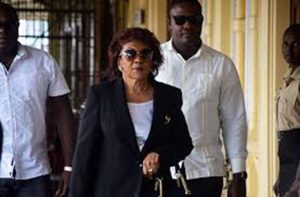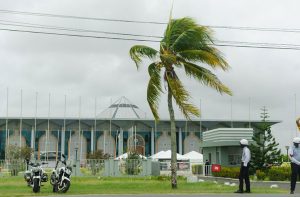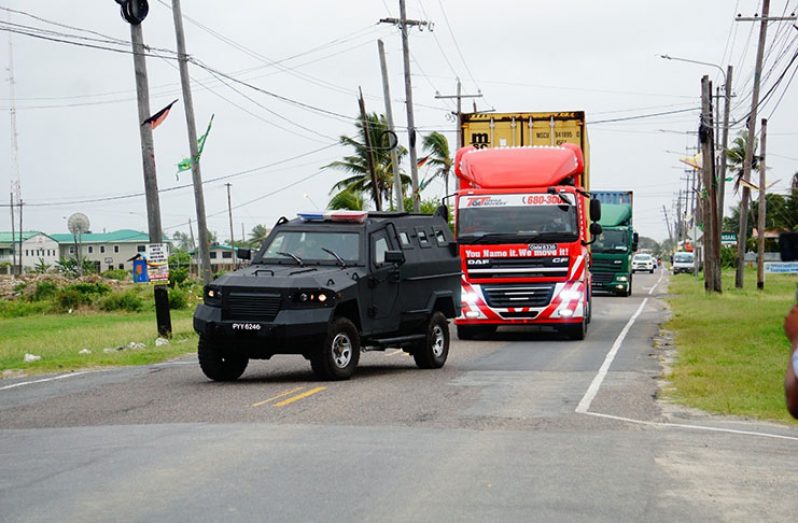…GECOM says all systems in place for commencement of exercise
…urges full cooperation from all parties involved
UNDER heavy police presence, the National Recount will commence today at the Arthur Chung Conference Centre (ACCC) under the supervision of the Guyana Elections Commission (GECOM)–a process intended to bring an end to the prolonged electoral impasse.
The journey to this point has been a long one. Public Relations Officer of GECOM, Yolanda Ward, is hopeful that – with all systems in place – the recount of votes cast at the March 2 General and Regional Elections will be smoothly executed.
“We have prepped our systems in such a way to be prepared for the smooth conduct of the exercise. We asked that we have the full cooperation of those involved in the process to ensure that this is done in an orderly and expeditious manner and that we have a smooth flow of the activity. And of course, at the end of the exercise that the results are accepted by all parties involved,” Ward told Guyana Chronicle in an interview on Tuesday.

She iterated that all systems would be in place for today’s recount. The final arrangements were being put in place on Tuesday evening. “As you are aware, we have moved all the containers for all of the regions to the Conference Centre today (Tuesday). All the other logistics and administrative arrangements have been put in place and we anticipate that everything will be completed for an early start,” she said.
Within a period of 25 days, GECOM is expected to process 2,339 ballot boxes containing more than 500,000 votes cast in both the General and Regional Elections in the country’s 10 Electoral Districts. Once the votes have been counted and the Statements of Return (SORs) tabulated for each Electoral District, the Chief Elections Officer (CEO), Keith Lowenfield, will then calculate the results based on the declarations and submit a report to the Chair of GECOM, Justice (Ret’d) Claudette Singh for deliberation at the level of the Elections Commission.
Importantly, the counting, tabulation process and the final declaration of the results will be observed by both Local and International Observers, including a team of scrutineers from the Caribbean Community (CARICOM), and will be broadcast live.
Ahead of today’s recount, President David Granger reiterated his long-held position that he will accept the results of the General and Regional Elections when they are declared by GECOM. “I have said, repeatedly, that I shall accept the declaration of the results by the Elections Commission, which will allow for a democratically-elected government to be sworn in to office,” the Head of State said in an address to the nation on Monday.
But how did Guyana arrive at this point? It started with repeated disruptions during the tabulation of the Region 4 Statements of Poll (SOPs) by Returning Officer (CEO), Clairmont Mingo. In court documents filed in the High Court, Mingo noted that his attempt to execute his mandate was met with repeated objections and disruptions by the Opposition.
But notwithstanding loud screams of “No” in the Command Centre at High and Hadfield Streets, Mingo declared the results for Region 4 – the country’s largest electoral block – on Thursday, March 5, 2020. That declaration – the final of the 10 Electoral Districts – placed the A Partnership for National Unity + Alliance for Change (APNU+AFC) in the lead – with thousands of votes ahead of the People’s Progressive Party/Civic (PPP/C), the main opposition party. The centre immediately descended into chaos with representatives from the PPP/C and a number of small political parties clashing with the police in their attempt to break open the door of an office, the GECOM Chair was operating in. By the end of that day, international observers flagged the electoral process, with the majority of them contending that tabulation of the SOPs in Region 4 lacked transparency.

It was that very day that the PPP/C, through a private citizen – the late Reeaz Holladar, secured an injunction from the High Court blocking the declaration of the results of the elections on the grounds that Mingo did not comply with the Electoral Laws during the tabulation process. The next day, March 6, violent protests erupted within PPP/C stronghold areas.
On March 11, Chief Justice Roxane George-Wiltshire ruled that the declaration of the results for District Four was in breach of Section 84:1 of the Representation of the Peoples Act. Much to PPP/C’s satisfaction, the High Court found that for a large percentage of the SOPs was tabulated in the absence of those entitled to be there in accordance with Section 86 of the Representation of the Peoples Act.
But by March 13, the PPP/C moved to the High Court again, this time filing contempt proceedings against Mingo, the GECOM Chair and the Elections Commission. In hearing the contempt case, Chief Justice (ag) said the Returning Officer must produce the SOPs during the tabulation of votes for his electoral district. It was then the GECOM Chair gave a commitment to the High Court, that if after a request for a final count or recount, there were still disputes, she will facilitate a recount through the Commission. Mingo, according to the Chief Elections Officer, for a second time, tabulated the Region 4 SOPs in accordance with the Laws and Ruling of the Court on March 13, and declared the results. However, the results were not accepted by the PPP/C.
On March 14, the contempt proceedings came up in the Court but was shelved after the Chairman of CARICOM, Prime Minister of Barbados, Mia Mottley, announced that President Granger and the Opposition Leader, Bharrat Jagdeo, had agreed to a National Recount under the supervision of a CARICOM high-level team.
An Aid Memoire was subsequently signed by the two leaders, and GECOM had agreed to a recount. The order was drafted. However, by March 17, a private citizen, Ulita Moore, challenged the legality of the recount. High Court Judge Franklin Holder had granted her a total of four injunctions, bringing the wheels of the electoral process to a halt once again. During the course of that court matter, Jagdeo filed an application for Discovery of the SOPs but it was refused by Justice Holder on March 27. However, he had established that the Court had jurisdiction to hear the substantive matter brought by Moore.
But on March 31, the Full Court ruled that the Court had no jurisdiction to hear the case brought by Moore, on the grounds that the issues raised could only be dealt with by way of an Elections Petition. In arriving at the decision, the Full Court considered Articles 162 and 163 (1) of the Constitution, Sections 22 and 23 of the Elections Law (Amendment) Act of 2000, Section 140 of the Representation of the People Act and Section 3 of the National Assembly (Validity of Elections) Act. This decision, however, was appealed by Moore, and, though the Appellate Court did not grant all the orders sought, it ruled, on April 5, that agreement that usurps the powers of GECOM to supervise elections in Guyana would be unconstitutional.
On April 3, two days before the ruling of the Appellate Court, the Elections Commission had taken a decision to proceed with the National Recount but under the supervision of GECOM, though it was agreed that CARICOM would be integrally involved.
In justifying its decision in an order published on Monday, GECOM explained that though the declarations of the results were made in accordance with Section 84 (1) of the Representation of the People Act, requests for recounts in a number of electoral districts were rejected, aborted, or held in abeyance. It noted, too, that a report detailing the results of the elections was submitted to the Chairman of the Elections Commission, but that, too, was held in abeyance, and aspects of the election process challenged in the Court. In keeping with the general consensus among the political parties that a recount was necessary, the Elections Commission said it took the decision to facilitate the recount, in accordance with Article 162 of the Constitution, and Section 22 of the Elections Laws (Amendment) Act.




.png)









